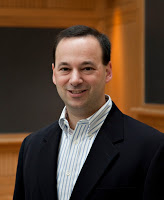- Public Policy
- Leadership
- Funding
- News & Events
- About the Center
Back to Top Nav
Back to Top Nav
Back to Top Nav
Back to Top Nav
Rockefeller Center Director Andrew Samwick provides commentary on a variety of issues in the Direct Line, which is published at the start of each term.
Looking forward to the coming year, Rockefeller's newest opportunities will be on campus, particularly in the academic realm. The Center's Public Policy Minor will sponsor five new courses; up from its usual two (see course listing on page 2). These courses will cover a broad range of topics, including law, journalism, urban politics, and poverty. Most importantly, the Center will add a new course this fall, “Introduction to Public Policy Research” (IPPR), as a cornerstone of the Public Policy Minor. The IPPR course focuses on the theory and practice of conducting research relevant to public policy discussions. Selected students in this course will also have the opportunity to join the Center's Policy Research Shop in the winter and spring terms and work in support of elected policy makers in New Hampshire and Vermont. Student researchers will provide them with timely, objective research on issues confronting the two states. Last year, students conducted research on Medicaid, the No Child Left Behind Act, and a range of environmental and energy issues.
Student-initiated research is an essential component of a liberal arts education. Students must learn to distinguish the truth from a set of competing propositions, and they must take the further step of choosing for themselves what questions to ask, which truths to seek. In the public sector, good research makes good policy. The Center's new course offerings emphasizing research complement its existing programs based on discussion and leadership. I look forward to reporting more on these exciting new programs as they develop.
 Andrew A. Samwick is the Director of the Nelson A. Rockefeller Center for Public Policy and the Social Sciences, the Sandra L. and Arthur L. Irving '72a, P'10 Professor of Economics at Dartmouth College, and a research associate of the National Bureau of Economic Research. In 2003 and 2004, he served as chief economist on the staff of the President’s Council of Economic Advisers.
Andrew A. Samwick is the Director of the Nelson A. Rockefeller Center for Public Policy and the Social Sciences, the Sandra L. and Arthur L. Irving '72a, P'10 Professor of Economics at Dartmouth College, and a research associate of the National Bureau of Economic Research. In 2003 and 2004, he served as chief economist on the staff of the President’s Council of Economic Advisers.